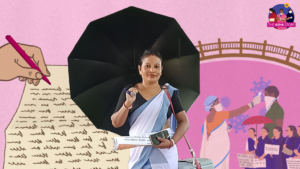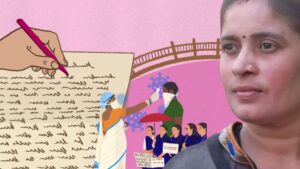Promised, Mostly Never Paid: Rs 1,000 Covid Wage To Million Health Workers
In this three-part series, we look at the crucial work of India's ASHAs, and their fight for recognition as they face delayed payments, meager wages, and growing workloads during the COVID-19 pandemic.
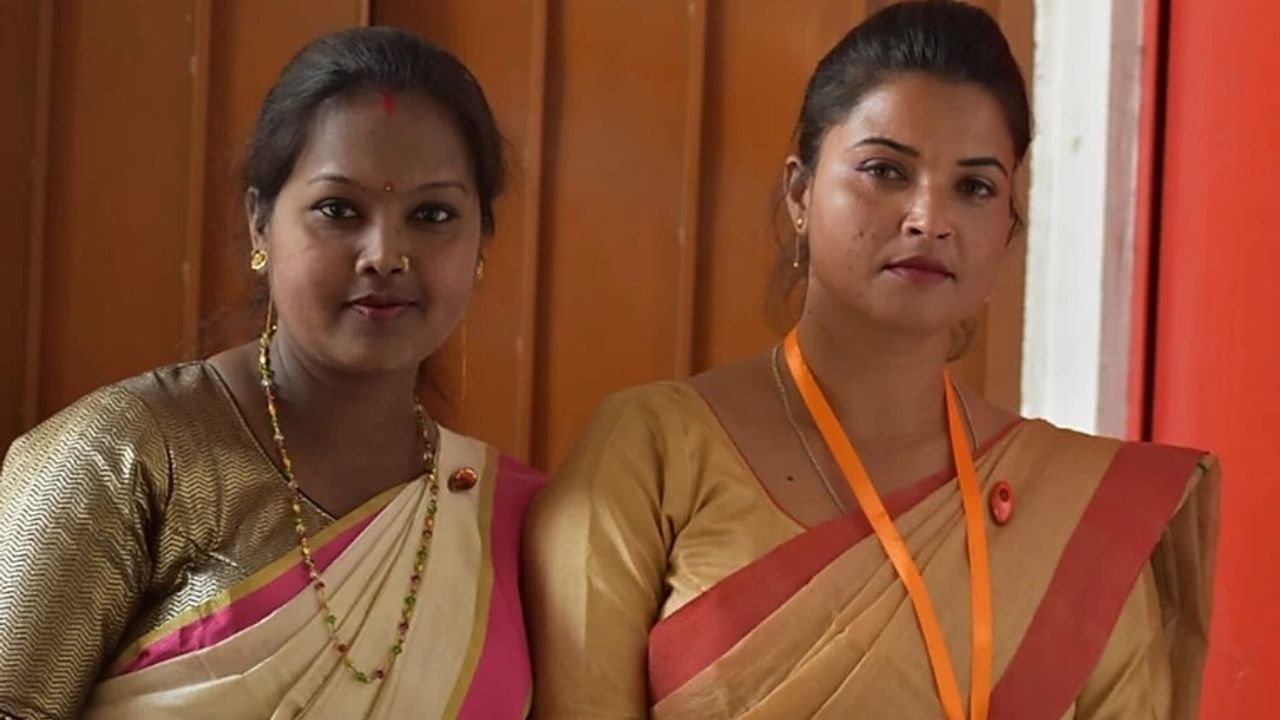
Minara Begum (right), an ASHA worker from Assam. ASHAs in Assam have not been paid their regular honorariums for the last 3 months.
Minara Begum, 33, has reached breaking point. “If the government of Assam does not release my salary today, my kids will starve,” said the mother of four, her voice choked with emotion. “I have done many dharnas (protests) and agitatiations in the past. Now I am literally begging the government to send my money.” Her youngest son is two-years old.
Minara Begum, is an Accredited Social Health Activist (ASHA) working in Assam’s eastern district of Kamrup Metro, one of a national volunteer cadre of over one million women health workers who serve as a crucial interface between India’s community and public health delivery, providing maternal and child health care, immunisation and other services and supplying the government with on-ground health data.
The government of Assam has not paid Minara her monthly “honorarium”–so called because ASHA workers are seen as volunteers rather than employees–of Rs 3,000 a month between March and May. Besides, she has lost out on an additional sum of at least Rs 2,500 a month, paid out as incentives for activities such as immunisation and home-based prenatal care that were suspended during the lockdown.
She is also owed Rs 3,000 from a health insurance claim she made under the ASHA Kiran scheme way back in 2017, for a gastric-ulcer surgery.
And, she had to forego the Rs 500 she used to earn from renting out two rooms in her house, vacant due to the lockdown.
After her husband, Munaf Ali, a driver, lost his job six months ago, Minara became the sole breadwinner in her family. To put food on the table, she sold her teenage daughter’s mobile phone for Rs 2,000, but that money did not last very long. Rupjan Begum, her supervisor Auxiliary Nurse Midwife (ANM) at the public health centre (PHC) that falls in her area then loaned her Rs 3,000. From time to time, said Minara, she has helped her out with rice and pulses to get by.
“Everytime I ask for help, a bit of my dignity dies,” said Munara. “Our job involves telling people in our community to eat nutritious food. And we are unable to arrange even basic food for our family. Isn’t it ironic?”
This month, she is selling her steel almirah to the local anganwadi centre. It will fetch her Rs 3,000 to buy food.
“I would rather sell what I can than stretch my palms out for money,” said Munara. “People often wonder why we have to borrow when we are government workers of the prestigious National Health Mission (NHM).”
This is because ASHA workers, an already underpaid workforce, are facing salary delays, not receiving the promised Covid incentive and losing out on their regular incentives during the pandemic.
In April 2020, Government of India, announced a Covid incentive of Rs 1,000 a month to be paid from January to June to ASHAs for their essential Covid-related work under the India Covid-19 Emergency Response and Health Systems Preparedness Package. The order also directed state governments to ensure that their regular honorarium of Rs 2,000 be paid along with the task-based incentives such as immunisation and antenatal care.
In a survey conducted by Article14 and Behanbox, a digital platform for gender data and stories, between April and May in 16 states across India to track the work conditions and incentive payments of 52 ASHA workers and ASHA union leaders, we found that most state governments were not complying with the central government directive.
“We found that 75% of states had not paid the Covid incentive when the survey was conducted. Even regular honorariums in 69% states were delayed, in some cases for up to five months. And not a single state was paying the regular incentives for activities such as immunisation that were suspended during the lockdown.”
These interviews were conducted in Kerala, Karnataka, Andhra Pradesh, Telangana, Madhya Pradesh, Chhattisgarh, Rajasthan, Gujarat, Maharashtra, Punjab, Haryana, Uttar Pradesh, Bihar, Jharkhand, Tripura and Assam.
Forced To The Brink
In most states, except Andhra Pradesh, Kerala, Karnataka, Haryana, West Bengal and Sikkim, ASHAs do not get a fixed monthly payment.
They are entitled to Rs 2,000 a month, doubled in October 2018 from Rs 1,000 by the central government for a set of eight tasks, including organising village health and nutrition days and convening the village health, sanitation and nutrition committee every month, listing and updating household data every six months, maintaining a record of births and deaths, preparing monthly child immunisation lists, and updating lists of newly married couples.
ASHA workers also earn incentives for 66 tasks, as we reported earlier: Rs one for every oral rehydration solution (ORS) packet distributed, Rs 300 for each institutional birth and antenatal care and so on.
These payments and incentives are almost inevitably delayed, sometimes by up to five months in many states. Even in pre-pandemic times, ASHA workers who come from very poor families and marginalised communities, such as Dalits and Adivasis, found it difficult to run their households on their payments.
“Now, during the pandemic, due to endemic salary delays, ASHAs are being pushed to greater economic vulnerability and destitution.”
At the frontline of India’s Covid resistance, ASHA workers across states find that their workload has more than doubled while their incomes would have reduced– when they are finally paid — sometimes by over half. This has hit ASHAs hard as many are now the sole earning members of their families after their other family members have lost their jobs due to the lockdown.
In Part 1 of the series, we reported how ASHA workers are crucial to the pandemic response in challenging conditions–tracking and tracing people with travel history and Covid symptoms, reporting them to the Public Health Centres, arranging for their testing and educating the public –with minimal protection, inadequate support from higher level healthcare staff and rising hostility.
Here, we explore how the policies of different state governments towards ASHA workers during the pandemic is making an already exploited workforce even more vulnerable.
Scrimping On Promised Covid Incentives
ASHAs across states said that the Rs 1,000 ‘incentive’ announced by the central government was an ‘insult’ and disproportionate to their labour.
“Government pays Rs 30,000 to Rs 40,000 every month to staff whose job it is to sit under the fan and wait for our reports to feed into the online systems,” said an angry Champaben Rathwa, an ASHA working in Sonagadh in Bhavnagar district of Gujarat. “We leave our children behind, not knowing if we will come back home and what do we get? Rs 33 a day. Would you risk your life for this money?”
Some state governments like Haryana have said they would double the basic pay for its healthcare staff including doctors, nurses, laboratory technicians and ambulance drivers, for their Covid services. ASHA workers did not make the list.
“Every other healthcare worker’s job begins only after we have identified the Covid positive person,” said Sunita Rani. “But the government thinks that their labour deserves extra incentives while our’s does not.”
The Central government has also announced Rs 50 lakh insurance for ASHA workers who die during Covid duty under the Pradhan Mantri Garib Kalyan Yojana.
“ASHAs’ life has no value to the government,” said Kaushalya, an ASHA from Saraikela district in Jharkhand. “That is why it has put a value to our death after sending us to dangerous containment zones without adequate safety.”
In many states, ASHA workers have died while on Covid duty due to exhaustion, stress, hunger and even road accidents while walking back from surveys. In Andhra Pradesh and Bihar where six ASHA workers have died, governments have not announced the insurance amount despite several representations by ASHA unions.
In May this year, the Nagpur Bench of the Bombay High Court directed the government of Maharashtra and Union of India to pay ASHA workers an extra Rs 200 a day as Covid incentive. On May 14, ASHAs across the country held a virtual protest demanding Rs 25,000 as one time Covid allowance along with demands for proper PPE (personal protection equipment) and mandatory testing for all ASHA workers.
State governments are finding ways to cut corners during the pandemic. While the centre has directed Rs 1,000 incentive to be paid from January to June, none of the states, except Maharashtra and Kerala, is doing so. Maharashtra has recently increased the Covid incentive to Rs 2000 to be paid from April to June.
Four states including Tripura and Punjab have not announced the months that the incentive would be paid for and another four have said they will pay only from April to June, even though Covid activities began in March.
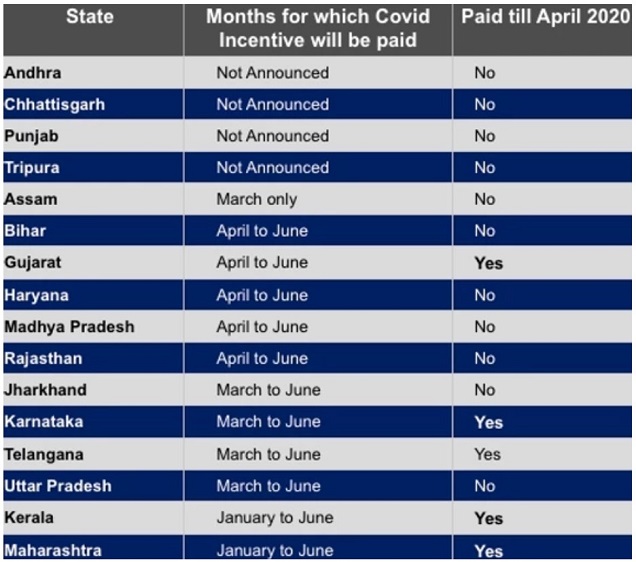
(Covid Incentive of Rs 1,000 has not been paid in 75% of the states.)
Telangana has paid only Rs 750 for the month of March, while they paid Rs 1000 for April. Chhattisgarh has told ASHA workers, who are known as mitanins in the state, to complete a survey of 100 households a month to be able to claim this allowance.
“I live in a village of 30 Baiga tribal families. I have to make three trips to cover the same households to claim this incentive. And, yet we have not been paid,” Suman Thakur, an ASHA from Kodwagodham village in Kabirdham district of Chhattisgarh told us.
Assam has paid the incentive for March in some districts but told ASHAs that future payments would be made only when more funds become available.
Haryana said it would pay only Rs 500, a statement it rescinded after protests by ASHAs.
The Karnataka cabinet recently decided to pay an additional one-time incentive of Rs 3000 for ASHAs.
“This is a welcome move but unfair to Anganwadi workers who along with ASHA workers constitute the village-level task force for Covid-19 monitoring in Karnataka. Why should they be left out?” asked S Varalakshmi, president of Karnataka ASHA union.
“How Much Money Will The Government Save By Taking Away Our Rs 100?”
T Yadamma (35), an ASHA worker from Domalguda in Hyderabad, is feeling the squeeze as her household now solely depends on her honorarium of Rs 7,500 — the most she is entitled to — from the Telangana government. After paying Rs 6,500 as rent, she is left with Rs 1,000 for all her other household expenses. Now, for the month of April, she has received just Rs 4,000 as there were no institutional deliveries.
In March, her severely asthamatic husband T Sridhar, an autorickshaw driver who managed to earn Rs 10,000 a month, found himself out of work due to the pandemic. The family is now unable to afford his asthma medicines.
Recently, the private school where she sends her two boys, Akhileshwar, 11, and Harshith, 9, asked her to pay their tuition fees of Rs 3,500 a month each for the period between January and May. Unable to come up with the Rs 35,000 required, she is considering pulling her children out of the school, a decision that is causing her a great deal of mental stress.
“We have not stopped our regular activities during the pandemic. We have conducted non communicable disease surveys, checked on pregnant women over the phone and motivated people to go to primary health centres for vaccination. How can the government not pay us those incentives?” she asked.
In the last three months of Covid duty, ASHA workers like Yadamma across states have seen their regular incomes drop by anywhere between Rs 2,500 and Rs 4,000 per month.
“Defying the central government directive, states are refusing to pay the additional task-based incentives for suspended activities. Between March and April, ASHA workers have only been assured of an honorarium of Rs 2,000 set by the central government for a set of eight core tasks they perform.”
A significant loss of income comes from reduced maternity services in government hospitals. Under the Janani Suraksha Yojana (JSY), ASHA workers are paid Rs 300 for accompanying women to government hospitals. Now, under lockdown, women are giving birth at private hospitals or at home, and this incentive has shrivelled up too.
“States should have calculated an average of the incentives ASHA workers received between January and March and set that as fixed pay during the pandemic instead of cutting back on the already meagre incentives they get,” said Sulakshana Nandi, national joint convener of Jan Swasthya Abhiyan, a national network that advocates for equitable health policies.
Even before the pandemic, governments found ways to cut back on the variable incentives of ASHA workers in several states. Gujarat, for instance, pays the maternity incentive only for accompanying below poverty line (BPL) women.
The government of Tripura has whittled away several incentives over the last two years. ASHA workers who are entitled to Rs 150 for attending the monthly primary health centre meeting are now paid Rs 50 and maternity incentive has been cut to Rs 250 from Rs 300.
“How much money will the government save by taking away our Rs 100?” asked Nehera Begum, an ASHA from Tripura.
Delayed Payments, Rising Expenses = Debt Cycle
Even routine payments in 13 states we tracked are delayed, some by up to five months. Disbursements within states are uneven. For instance, in the tribal districts of Dangs, Panchmahal and Tapi of south Gujarat, honorariums have not been paid for the last five months, pushing ASHA workers from marginalised and tribal communities into greater vulnerability.
ASHA workers in many districts of Haryana had their previous salary dues of four months from October 2019 upto February 2020 cleared only earlier this month, said Sunita Rani, from Sonepat district.
In most states, ASHAs told us, incentives are routinely delayed and some have lost count of what is owed to them by the government. In Madhya Pradesh, ASHA workers’ incentives for support and care to Tuberculosis patients have been pending for five years.
“Frankly, we are just relieved to see any amount of money in our accounts. We fill all sorts of forms but do not know what we finally get paid for,” said Ranjit Kaur, an ASHA worker from Ropar district in Punjab.
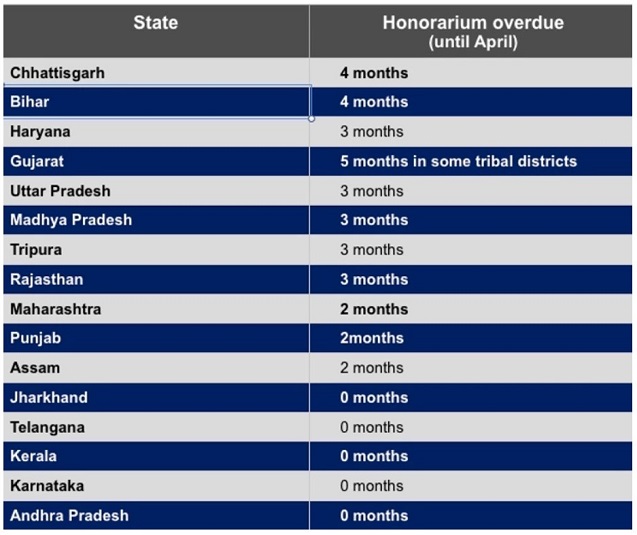
(ASHA workers honorarium delays in states, some upto 5 months.)
But the Covid pandemic has also increased the out-of-pocket expenditure for ASHA workers.
“We are having to spend additionally on soap and sanitizer to disinfect ourselves since the government won’t give us any,” said Champaben Rathwa, the ASHA worker from Bhavnagar in Gujarat. “We buy water, lemons, sugar to survive this heat during our surveys. All this adds up.”
Even in pre-pandemic times, ASHA workers had to spend their own money on transport when they accompanied women to the district hospitals for deliveries or on stationery like the registers they are required to maintain.
“ASHA workers have always subsidised India’s healthcare system by spending out of their own pockets for fuel, stationery, transport etc which is essentially the government’s expenditure,” Nandi told Article 14.
“ASHA workers come from very poor families and some from abusive homes. They are now having to borrow from local money lenders at a high rate of interest to even put food on the table. How will they repay this?” asked Ranjit Kaur. “Governments need to think about this.”
“Those in government jobs earning Rs 30,000-Rs 40,000 still end up borrowing money,” said Minara Begum, the ASHA worker from Kamrup, Assam. “How can we live on a paltry Rs 3,000, which the government refuses to pay on time?”
ASHA Workers Demand To Be Counted
ASHA workers across states told Article 14 that they are deeply unsatisfied with their work conditions and the treatment they received from the government, especially during the pandemic. Many said they have considered quitting their job for something with a better pay.
“When we demand for better pay and work conditions, the officials in the health department ask us to leave if we are so unsatisfied,” said Pochamma, an ASHA worker from East Godavari district in Andhra Pradesh
“I have spent 16 years doing this job and building the community healthcare system. The community trusts and respects me. This is the only reason I stay on,” said Minara Begum.
“Apart from being underpaid, ASHA workers have neither been included in the Ayushman Bharat, the national public health insurance scheme nor state health insurance schemes, except in some states, despite the government’s claims in a Lok Sabha reply that they are entitled to life insurance and pension under various schemes.
In fact, ASHA workers who had been receiving widow pensions were terminated from service in Andhra Pradesh in April for receiving dual incomes, said T. Dhanalakshmi, the ASHA union president of the state.
In the coming months, as more migrant labour return to their homes and the risk of infection gets higher, ASHA workers will have to put in even more hours of work monitoring their health status and well-being during the mandatory 14-day quarantine along with their non pandemic health activities. The government has not given any indication of whether the Rs 1000 Covid incentive would be extended beyond June.
“Government extracts such crucial labour from women in this country which is neither counted nor paid for. How can it realise the dream of making this country disease free if it pushes its ASHA workers into greater physical, mental and economic distress,” asked Sunita Rani.
Previously article of this series: Anger, Distress Among India’s Frontline Workers In Fight Against Covid-19
This reportage was supported by the Thakur Family Foundation. The Thakur Family Foundation has not exercised any editorial control over the contents of this reportage
We believe everyone deserves equal access to accurate news. Support from our readers enables us to keep our journalism open and free for everyone, all over the world.
